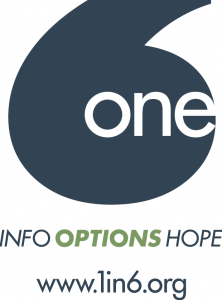You can leave this site quickly.
Learn more about Internet safety.
From 1in6: A Word About Language
We’ve thought a lot about language at 1in6. I used to be a newspaper reporter. So I’m always conscious that what words I choose, how I speak, how the words are interpreted or understood can all determine, how the reader or listener takes in the meaning of the information.
When we’re talking about violence, language can have a huge effect on whether a person hearing about a given situation feels safe or threatened by the description.
Sometimes, we are asked why many words, which are commonly used by others in discussions about sexual abuse, are rarely, if ever found on the 1in6 Website or in our materials—words like “predator”, “perp”, “perpetrator”, “pervert,” “abuser”, “molester”, “sex offender”, “rapist”, and “victim” among them. (We even use “survivor” sparingly.)
Getting in touch with anger and loss can be a valuable part of healing. And using any of these words (and others) about those involved, and experiencing the emotions and the images they evoke, are valid, useful, perhaps sometimes even necessary steps for a man in the process of understanding his feelings and the dynamics of his abuse.
Anger is the one emotion that social norms for males encourage men to express. But I know that men actually have a much richer emotional life. Men—including men who’ve experienced abuse—can also feel sadness, and fear, and betrayal, and shame and hope and tenderness, and love and lots of other emotions.
I’ve found that once men in their healing process move beyond coming to terms with anger, holding onto defining words like “abuser”, “sex offender”, “perpetrator” and “victim,” runs the risk of forever locking the people who were involved in the abusive interaction into set roles. Always thinking of the person who abused you in that role can also keep them seeming larger than life—and you smaller. With healing comes the realization that in the present, you needn’t continue to relate to them as an all-powerful adult (or older child); or yourself, forever as a powerless child.
For me, one of the most liberating aspects of healing from childhood sexual abuse was learning that the traumatic experience was something that happened to me, not an identity, not who I am. And so, with that in mind, we’ve chosen to focus on experiences, behaviors and actions and to avoid using words that suggest an unchangeable identity for anyone involved.
The underlying goal for all of 1in6’s work is to help create an environment where men can safely speak about their unwanted or abusive childhood sexual experiences – in an effort to heal. One of the great benefits of the 1in6 Website, is that people can explore their childhood experiences at their own pace, alone, and anonymously. The 1in6 Online SupportLine, provides a resource for immediate support if a visitor becomes swamped or overwhelmed by their feelings or memories.
You’ll notice that in our literature and on our Website, we use the term “unwanted or abusive sexual experiences in childhood” rather than just “sexual abuse.” We think it’s especially important when working with men, to create a space where a man doesn’t have to define what happened to him as “abuse” or see himself as a “victim” in order to start exploring what impact a confusing experience had on his life. Each of us has the right to define our own understanding of what occurred.
And, we know that a man might still have a complex and sometimes close family or community relationship with the person who harmed him. That’s another reason we consciously strive to avoid the demonizing (and therefore possibly confusing) imagery that using terms like “predator,” “perpetrator”, “molester,” “ sex offender” and “abuser” about those who sexually abuse children may stir—especially when reaching out to men who may not have that view. Talking about someone’s abusive or harmful behavior toward you may feel even more possible, if it doesn’t have to involve automatically placing them in one of those categories.
And we also know that as much as 40 percent of sexual abuse of children is committed by older or more powerful children—often in reaction to, or as a coerced part of the older child’s abuse experience. Imposing a demonizing identity on a man for behaviors that he, as a child, may have felt were not within his control, just adds further damage to the man’s ability to heal.
“Person first” language can be a good way of honoring the range of those feelings (i.e. “…the friend of my family/my cousin, who sexually abused me; “……the babysitter who assaulted me,“ or just “….the man/woman who abused me.”) Using real descriptions of who they were in relation to you and what they did actually highlights the betrayal of that relationship, which the abuse caused. It also may become more possible to discuss actions that hurt you with someone who you may still care about.
 - By Peter Pollard
- By Peter Pollard
Peter Pollard is the Training and Outreach Director for 1in6, Inc. Peter previously worked for 15 years as a state, child-protection social worker and was the Public Education director at Stop It Now! Since 2003, he has served as the Western Massachusetts coordinator for SNAP (Survivors Network of those Abused by Priests) and also does work for a Certified Batterers Intervention Program.
The mission of 1in6 is to help men who have had unwanted or abusive sexual experiences in childhood live healthier, happier lives.
1in6′s mission also includes serving family members, friends and partners by providing information and support resources on the web and in the community.
Joyful Heart and 1in6 invite you to visit 1in6.org for info, options and hope, and to learn more about our partnership and Engaging Men initiative at men.joyfulheartfoundation.org.
The views expressed above are not necessarily those of the Joyful Heart Foundation or 1in6.




Your Voices